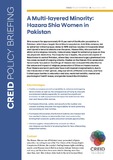| dc.contributor.author | Sultan, Sadiqa | |
| dc.contributor.author | Kanwer, Maryam | |
| dc.contributor.author | Mirza, Jaffer | |
| dc.coverage.spatial | Pakistan | en |
| dc.date.accessioned | 2020-12-17T15:25:54Z | |
| dc.date.available | 2020-12-17T15:25:54Z | |
| dc.date.issued | 2020-12 | |
| dc.identifier.citation | Sultan, S.; Kanwer, M. and Mirza, J. (2020) A Multi-layered Minority: Hazara Shia Women in Pakistan, Policy Briefing 1, Coalition for Religious Equality and Inclusive Development, Brighton: Institute of Development Studies | en |
| dc.identifier.uri | https://opendocs.ids.ac.uk/opendocs/handle/20.500.12413/15878 | |
| dc.description.abstract | Shia account for approximately 10–15 per cent of the Muslim population in
Pakistan, which has a largely Sunni Muslim population. Anti-Shia violence, led
by extremist militant groups, dates to 1979 and has resulted in thousands killed
and injured in terrorist attacks over the years. Hazara Shia, who are both an
ethnic and a religious minority, make an easy target for extremist groups as they
are physically distinctive. The majority live in Quetta, the provincial capital of
Balochistan in central Pakistan, where they have become largely ghettoised into
two areas as result of ongoing attacks. Studies on the Hazara Shia persecution
have mostly focused on the killings of Hazara men and paid little attention to
the nature and impact of religious persecution of Shias on Hazara women.
Poor Hazara women in particular face multi-layered marginalisation, due to
the intersection of their gender, religious-ethnic affiliation and class, and face
limited opportunities in education and jobs, restricted mobility, mental and
psychological health issues, and gender-based discrimination. | en |
| dc.description.sponsorship | Foreign Commonwealth and Development Office (FCDO) | en |
| dc.language.iso | en | en |
| dc.publisher | Institute of Development Studies | en |
| dc.relation.ispartofseries | CREID Policy Briefing;1 | |
| dc.rights.uri | http://creativecommons.org/licenses/by/4.0/ | en |
| dc.subject | Gender | en |
| dc.title | A Multi-layered Minority: Hazara Shia Women in Pakistan | en |
| dc.type | Other | en |
| dc.rights.holder | © Institute of Development Studies | en |
| dc.identifier.doi | 10.19088/CREID.2020.011 | |
| rioxxterms.funder | Default funder | en |
| rioxxterms.identifier.project | Default project | en |
| rioxxterms.version | VoR | en |
| rioxxterms.versionofrecord | 10.19088/CREID.2020.011 | en |
| rioxxterms.funder.project | 9ce4e4dc-26e9-4d78-96e9-15e4dcac0642 | en |


